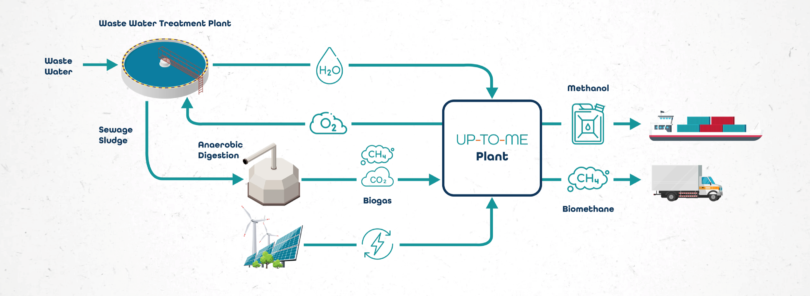The European Union project funded under the Horizon Europe framework programme (Grant Agreement no 101083323): Unmanned-Power-to-Methanol-production (UP-TO-ME), is approaching the end of its first year. The project has seen great development over the past ten months and is dedicated to its ongoing contribution to the objectives set by the EU of reaching net-zero emissions by 2050.
UP-TO-ME targets a ground-breaking change in decentralised Power-to-Methanol production for hard to electrify applications. The project is developing the first unmanned, fully automated and self-optimising technology to convert decentralised CO2 point sources to production sites for renewable fuels.
About the project
The UP-TO-ME concept represents an innovative solution integrating CO2 capture and methanol synthesis in a fully autonomous, unmanned plant. The technology will enable the use of CO2 from point sources, utilising locally available renewable energy. As a result, it opens up a multitude of possibilities for distributed production of methanol, empowering the UP-TO-ME technology to efficiently utilise diverse resources (i.e., biogas and renewable energy) while responding to dynamic environmental factors. This will make small scale production of methanol economically feasible for the first time!
The UP-TO-ME project is maximising the potential of the advanced 3D printing by utilising 3D-printed reactors and column packings designed with advanced Computational Fluid Dynamics (CFD) in order to reduce both unit costs and lead times associated with reactor manufacturing. Furthermore, combining dynamic plant models and artificial intelligence, UP-TO-ME will create a fully automated, self-learning and optimising control system to produce methanol even at fluctuating conditions at remote plant setups, while producing a clean fuel, suitable for hard to electrify applications such as marine vessels.
What makes the UP-TO-ME project so ground-breaking?
Globally over 90% of traded goods are transported by sea. The maritime industry is responsible for around 4% of CO2 emissions within the EU, equating to around 124 million tonnes per year. The aim of the UP-TO-ME project is to produce methanol as a clean fuel for maritime use to significantly reduce CO2 emissions. Additionally, the UP-TO-ME technology will upgrade biogas to biomethane that can be injected into the natural gas grid or used as a fuel for heavy goods vehicles. The UP-TO-ME project will make an invaluable contribution to the EU net-zero agenda by providing a suitable, clean fuel substitute for the maritime industry.
Unlike the existing methanol production plants, this groundbreaking technology possesses the ability to adapt itself to varying boundary conditions, such as the availability of renewable energies (i.e., solar, wind) estimated from weather forecasts, or on the availability of CO2 sources. This innovative technology will present limitless opportunities for distributed production of methanol in the future.
Project Partners
A European consortium has been formed to implement the project goals and ensure the project meets its objectives. The consortium consists of seven specialised organisations, all bringing a unique set of skills and expertise to the project.
- Teknologian Tutkimuskeskus VTT OY (VTT)
- Karlsruher Institut Fuer Technologie (KIT)
- Global Omnium Medio Ambiente, S.L. (GOMSL)
- Isle Utilities (ISLE)
- Aristotle University of Thessaloniki (AUTH)
- cloudfluid (CF)
The project has recently welcomed a new consortium member, ICODOS, a spin off-company from KIT that will build on the successful realisation of the project.
Project progress
Over the last ten months, VTT, our project coordinator, has overseen the project since its inception, VTT’s research on 3D-printed methanol reactors has progressed, and the first metal test prints have been performed. VTT plans to manufacture and assess a proof-of-concept lab-scale full 3D-printed reactor along with catalyst deposition tests to obtain further information for the evaluation of the reactor concept. GOMSL have been working on the characterisation of three biogas streams produced from the anaerobic digestion of municipal sludge. GOMSL has also started working with KIT in the modelling of different scenarios and configurations for the implementation of the UP-TO-ME solution, considering the whole value chain. Furthermore, CF are working on the CFD modelling of the process, and their research has led to a development of a breakthrough methodology to simulate Triply Periodic Minimal Surface (TPMS) structures at the pore scale. Additionally, AUTH has carried out a critical literature review and conducted market surveys to gain a deeper understanding of the methanol combustion process. Preliminary simulations, combined with the outcomes of the literature review, have already provided preliminary insights on the characteristics of methanol’s combustion and its environmental impact. Finally, ISLE, leader of Dissemination, Communication and Exploitation have released the project website and the UP-TO-ME social media channels (LinkedIn and Twitter). ISLE is currently working on the creation of the project video as well as the first project newsletter, to be released in October 2023 (Please, sign up to receive our newsletter here). Furthermore, ISLE is actively working on exploitation tasks to accelerate the market uptake of UP-TO-ME project innovative solutions.
The UP-TO-ME consortium is pleased with the progress that has been made so far and welcomes year two of the project with anticipation and enthusiasm for further progress and advancements.







